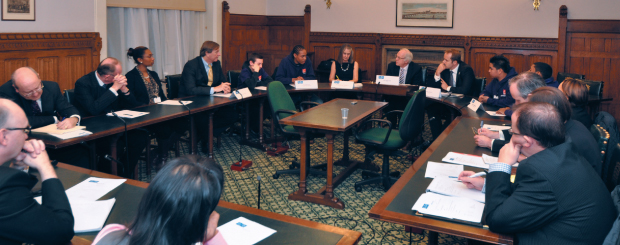From left: Jewel Barnes and TJ Anderson, both of Downside Fisher Youth Club, Ann Hodgson, Institute of Education, Nick Linford of FE Week, Nic Dakin MP, Christopher Monaf and Nathanial Danderson, also of Downside Fisher Youth Club
Meaningful careers advice and support would help 14-year-olds plan their futures, teenagers told a parliamentary panel.
Four members of Downside Fisher Youth Club in London spoke about their experiences in education at a seminar for the Associate Parliamentary Skills Employment Group’s (APSEG) cross-party manifesto for Learning, Skills and Employment.
The event, held at the House of Commons, was part one of Skills: A Life, a series of four discussion panels looking into the skills and employment issues facing those aged 14, 23, 35 and 50. APSEG said it recognised problems and changes in the workplace such as high youth unemployment, the volume of different career paths taken in a lifetime as well as the image of FE.
Speakers included FE Week editor Nick Linford, Graham Allen MP and Professor Ann Hodgson of the Institute of Education. Guests were invited from organisations such as City & Guilds, 157 Group, Skills for Justice, Learning and Skills Improvement Service, Policy Connect and Ofsted.
Sixteen-year-old TJ Anderson, one of the teenagers to address the panel, called for more one-to-one support for school pupils.
“When I was 14 I wanted to become an actor,” he told the group. “I was doing drama for a couple of years but I didn’t really get enough support so I dropped out. When I got to college I was pleased — I was there because I chose to go. I then decided to become a gym instructor and got lots of support.
“If I’d had support when I was younger I think I might have become a different person with different aspirations.”
He said if he could do things his way he would make sure that Year 9 pupils had monthly one-to-one meetings with school staff so that they had the chance to obtain “personal advice, full details and support. Fourteen-year-olds could then plan the next steps they took,” he said.
Graham Allen MP, a young learner from Downside Fisher Youth Club and Professor Ann Hodgson, Institute of Education
Professor Hodgson said school pupils should be given “meaningful careers guidance, information and guidance constantly” throughout the 14 to 16 stage and that young people should be given more opportunity to get out of the classroom to experience the real working world.
TJ said: “I think that would make a difference. In Year 8 you’re young and can get excited about going to places and your aspirations are high.”
David Harbourne, director of policy at Edge, said that pupils needed more exposure to FE colleges.
“People should take children to FE colleges in Year 8. Many have never heard of most jobs; all they know is what they see on television and on the high street. It would help to change the way they think about what to do for GCSE,” he said.
TJ added that it helped when big businesses came and told pupils of the opportunities available to them. “Barclays came in and spoke to us about jobs, which was great. It’s good for big companies to come in and give us hope,” he said.
TJ Anderson, 16, from Downside Fisher Youth Club
Meanwhile Rona Macdonald of Opito, the Oil & Gas Academy, said schools should push more “soft skills”, a suggestion that followed a meeting with a group of teenagers. “They were fidgeting, hardly any of them could hold eye contact with me and they were getting their parents to speak for them,” she said.
Mr Linford, of FE Week, highlighted the benefits of obtaining evidence “destination data” showing what jobs people gained through what routes.
“In 2009 I wrote about how FE has become obsessed with qualifications and success rates at the expense of evidencing positive progressions, such as gaining employment and moving on to higher levels of study,” he said.
“The situation in 2012 remains unchanged, which means it is hard to shout about the real difference vocational education can make to young people and adults.
“It’s critical that we resolve this information gap, to help promote FE to school children, as well as our paymasters, in the form of the Treasury.”
The next Skills: A Life session will concentrate on 23-year-olds, focusing on the changing youth labour market, alternatives to university after the rise in higher education fees as well as the role of welfare.
The seminar took place in Committee room 17 in the House of Commons Pictures by Shane Mann
Free lunches for learners is ‘no brainer’
By not offering all eligible college students free meals the government is “piling disadvantage upon disadvantage”, says Nic Dakin MP.
The member of the Education Select Committee, who is spearheading a campaign, No Free Lunch? led by the Association of Colleges (AoC), introduced a Ten Minute Rule Bill in Parliament calling on the government to extend the provision of free meals to qualifying students who attend sixth-form and FE colleges.
He told FE Week that it was a “no brainer” that 16 to 18-year-olds from disadvantaged backgrounds should get free lunchtime food. “More people from deprived backgrounds go on to vocational courses at FE and sixth-form colleges — 13.3 per cent compared with 8.3 per cent at school sixth forms,” he said speaking from the House of Commons where he was chairing a panel about choices for 14-year-olds.
“Yet they are not the ones allowed access to free school meals. It’s piling disadvantage upon disadvantage.
“I think every person, wherever they go, should be entitled to free meals if they meet the need.”
He said it was “absurd” how at Hackney University Technical College eligible students didn’t get free meals whereas those at Hackney Community College did — and they were both on the same site.
I think every person wherever they go, if they meet the need, should be entitled to free meals”
He added: “The age of participation in education is going up so why should those beyond 16 not be entitled?”
As a former principal, he said it was “absolutely crucial” for students to eat properly.
“Missing meals has a detrimental effect on performance. You’re more likely to miss classes, be inattentive and more likely to fail,” he said.
Mr Dakin said that David Laws, the Minister of State for Schools, had described the situation as an “anomaly” and that the government was looking at ways to address the situation.
After the MP introduced his Ten Minute Bill to Parliament he said he received “massive support” across the parties.
“Members from all sides came up to me — Liberal Democrats, Conservatives, Greens, Labour supporters and a Northern Irish MP,” he said.
“Many of them have now signed up to AoC’s petition.”
So far more than 5,600 had signed up a government e-petition.
To sign up to AoCs No Free Lunch? petition see www.aoc.co.uk or see epetitions.direct.gov.uk/petitions/31069.





Your thoughts